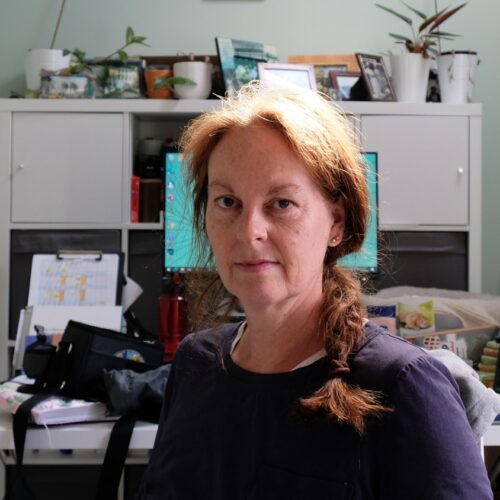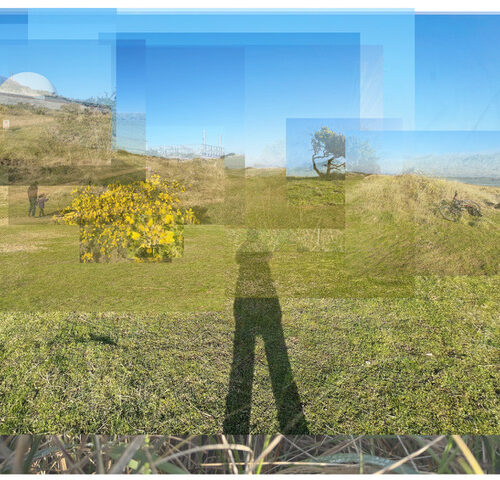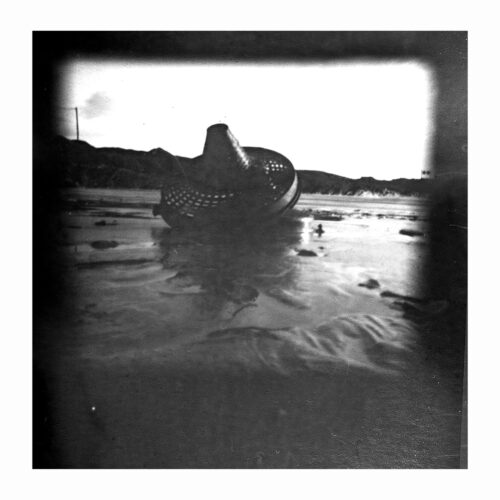
Landscape on my Mind
This is a post from the weareoca.com archive. Information contained within it may now be out of date.

As the ink dries on the new Photography Level 2 Landscape course, ready to be stuffed into envelopes for the first enrolled students, I thought this might be a good time to briefly share my experiences of re-writing this course as well as a hint towards what is in it.
The new Landscape course comprises 60 HE credits and is the last of the four courses that are on offer to Level 2 students, from which they will need to complete two in oder to progress on the Photography BA pathway. Although the ‘Landscape’ course was technically a re-write unlike ‘Gesture & Meaning’ and ‘Documentary’ which were brand new courses, it looks very different to previous incarnations.

In line with the other new courses, there is a greater emphasis on the theory side of things, rather than the technicalities of image-making, which students who have successfully completed Level 1 should be able to confidently bring with them to Level 2. What does that mean? Well, firstly, quite a bit more reading around the subject and a closer engagement than students might be used to with contemporary photography online, in print and where possible, at exhibitions. But in addition to this, the Landscape course will (hopefully!) move students closer to consider themselves as independent practitioners and think about what they can say about their current environment, situation and location. Students will themselves have to take greater ownership of their studies and work on their photographic assignments throughout each unit; there are fewer prescribed practical exercises than those coming straight from Level 1 will be used to.
It has been the best part of a year in the making, although I didn’t really start writing in ernest until October. Working out exactly where and what should go in each unit was no mean feat, especially with a genre that is as old and as diverse as landscape, flitting between fine art, documentary and commercial territories as well as media related to but not necessarily photographic as such. I wouldn’t describe the content as ‘eclectic’, but I am confident that it will challenge students who are approaching landscape photography from different angles, and with different levels of enthusiasm for the subject.

Gathering photographs to illustrate the course was also a major part of the process, and I would like to extend my gratitude to the photographers, artists and students who agreed to contribute towards the course, which have added depth and I believe really maintained a connection throughout the course between theory and practice.

Look here for a bit more detail and a rough breakdown of each unit. I will be discussing the course with tutors at a later date but if there are any questions from students then here would be a good place to ask them…






The course content looks immensely stimulating and interesting!
I’ve been pondering, although still a few years away, what I would do after Adv, since I know it won’t be the MA… UVC has found place at the top of my list, and this looks like a nice course to possibly return to, even after the degree (and UVC)…
Delicious images. Were they made by OCA students?
No, not these ones
Congratulations, Jesse!
The course material looks great.
Thanks Edith, and thanks again for your contribution.
It looks good and I’m looking forward to it one day when I’ve got through Level 1! Is there a reading list Jesse – it would be good to see so I can prepare myself in advance as I’m already acquiring books on landscape and cultural geography.
Hi Catherine, the reading list is quite extensive as there is a list for each section. But Malcolm Andrew’s ‘Landscape and Western Art’ accompanies the course. Although it’s currently out of print, Liz Well’s ‘Land Matters’ is a fantastic resource. If you’ve got an e-reader then you can get a copy of it. Also out of print, but might be able to get hold of it from your library is John Taylor’s ‘A Dream of England’
Thanks Jesse.
There’s an extensive and very interesting reading list that’s appeared in my core resources for landscape (I’m on the old course). I just wanted to say thanks very much for making that available as I’m finding some really helpful things for me to look into:-)
Didn’t know that it was – but am very pleased it is, and hope it’s useful.
Yeah, all looking good, and so much more stimulating than the previous notes. Well done Jesse, and having had you as my landscape tutor, I think it should be a winner.
Than you, Rob. I hope you are right and I hope you are continuing to enjoy your photography.
£1, 250 is quite an investment though, £2, 500 for L2. Will need to shop around before deciding.
You should of course see what else is on the market and choose what you think will challenge you the most. Obviously I’ve no say in the price tag, but in my experience, you get what you pay for.
Having just completed the old course, which I have to admit was showing it’s age and really needed a rewrite, I delighted to see a new course available (just wish I’d got to do it).
Looking at Paul Seawright’s image above it really brings to mind Fenton’s ‘Valley of the Shadow of Death’, which I’d never describe as a landscape image (although of course it is): it’s nice to see explicit reference to landscape as a means of social documentary; which is of course reflective of contemporary photographic practice [is 1855 considered contemporary :-)].
Yes, the Fenton image is also in the course notes and provides a very interesting reference point to Seawright’s image for many reasons. I wish I knew more about what was going through Fenton’s mind when he took the (two) images at Sevastopol – maybe he thought it should belong to a landscape tradition, or perhaps he didn’t even pay it any thought.
Here’s a link to some of Fenton’s images in the Library of Congress archive: http://www.loc.gov/pictures/collection/ftncnw/
I suspect you might be right Jesse; I’m sure he hardly paid it a thought: sometimes categorising things just gets in the way.
I find it interesting that the LOC only have the famous Fenton image: the earlier? image makes for a nice contemplation on when it’s ok to move other peoples balls to improve the shot.
http://opinionator.blogs.nytimes.com/2007/09/25/which-came-first-the-chicken-or-the-egg-part-one/
Thanks for that link, Thomas
This looks really interesting Jesse. It’s good to see that the course gets away from teaching the use of often superficial techniques which should be well established at level 2 and concentrates instead on themes in and uses of landscape photography. Like ThomasG I too wish I’d had the chance to do this one (I guess I could have waited by wanted to maintain some momentum)
Thank you, Nigel.
Yes, providing a stepping stone between Levels 1 and 3 was a key consideration. We do hope that by the end of Level 1 students will be confident with a range of skills and techniques. Of course there is always room for improvement and development, but we really hope students will focus on developing projects that address themes and ideas at Level 2 and I hope this course will facilitate students to do so.
“in my experience, you get what you pay for” – I don’t think that’s what you meant considering the OCA is one of the few affordable options :-)? In any case I checked other threads and I think I’m still eligible for the existing student rate at £835, so I’m still on board and likely to sign up in June. Do yo think Landscape is a good place to begin L2, and is it feasible to sign up for both L2’s so as to aim at completing within 15 months?
The course has been written to be an accessible entry into Level 2, as per the other L2 modules. It may be worth dropping your current/previous tutor a quick e-mail to ask their views as they will of course have a better idea of your practice and ‘where you are at’, so they may take a view.
As for the other questions, I’m afraid it’s not my department, although in my opinion, cramming in two 60 credit L2 modules – although feasible – seems like a bit of a rush. I think generally students that take about 12 months per module tend to get the most out of it, in terms of their development. Time to reflect on points and to let projects grow is really important. It can go the other way though if too much time is taken…!
Charlotte Church reflecting on the current state of Photography (Aperture Spring 2013) as a medium wonders about about “..What other medium is still exhibited so regularly in those dreadfully tired categories “landscape’, “portraiture”, and “still life”, as per forty years ago?” Does the title of the course fix the student to an expectation governed by the past forty years (perhaps 140 years!)?
What’s Charlotte Church doing talking about photography like that for – oh, hold on, I probably labelled her as “inane pop” so maybe… (no offence to any of her fans, just not my thing) Did you mean Charlotte Cotton? 8-D
Landscape “tradition” goes back longer than 140 years, and hopefully Wells’ excellent “Landscape Matters” will be on the reading list for the module – if not, I’d recommend it to anyone looking at doing this module. The truth of the label is that everything gets one, you just need to push the boundaries of what it means.
And of course, I meant “Land Matters” – serves me right for picking on John :-}
I would, of course, say that Landscape does matter, Cotton was of course talking about a photographic tradition and I was rounding numbers.
Charlotte Church LOL.
Everything comes out of something John so to my mind there’s no issue with genre being a basis to react against/work within so long as you aren’t required to situate yourself right in the middle of someone elses long lost pastoral dream without a critical thought in your head (which I know we’re not)
I wasn’t proposing anything merely reflecting on Cotton’s enthusiasm for what she appears to be suggesting is a pivotal moment on the history of (art) photography. Her contention is that we are now at a place where not only are the practitioners of the medium of photography immersed in the digital domain, but that the art photographers haven’t had the rigour of analogue photography as the means by which they drown themselves in the medium. Suggesting that this new generation is “high versus low agnostic” when it comes to how to engage with their audience.
I read that article too! I didn’t read it that way though, I read her as suggesting we needed new ways of thinking about and describing the diversity of practise in photography now as the old ways aren’t really viable for much work that is starting to happen. I think I agree with her on that.
However I think its true that new work is still coming out of a tradition of some sort, whether it be fine art, conceptual art, vernacular art, appropriation art or landscape photography. It gives you a framework to think of things in – without that you are without any terms of reference that you can use to be sure there is rigour to your work.
Yes, a Cotton as opposed to a Church – goodness knows where that came from…..
Fabulous mistake John, it reminds me of an embarrassing moment once when I worked for the Department for Education. In a very large meeting of officials I referred to ‘research led by Una Stubbs of the National Foundation of Educational Research’ and then was taken aback when the room collapsed in laughter.
To this day I do not know how I confused an eminent educational researcher (Una Christophers) with an actress from ‘Till Death Us Do Part.’
I really like the content of this new course. I finished the old style course just recently and found some of the exercises were really dated and although there is a certain discipline to them, it can stifle creativity This looks so much more interesting!
Margaret
As someone studying the new Landscape course and with experience of the former I have to say that the new version is considerably better in my experience. As many have said the old course was past its sell by date and particularly in its rather dated technical exercises. These have disappeared and the new approach to the subject
looks very interesting. I have flicked through the entire course and the assignments look to be well designed to complement the coursework that precedes them.
It is early days but this course is already helping me to better understand what are to me the slightly less tangible concepts of the artistic world with their layers of hidden meanings and codified structure in a way that no other OCA course has managed thus far. I am even starting to put my own creative preferences into some level of context which is a major step for me.
Dave
I don’t see any mention of Michael Freeman being involved in the re-write, has his involvement with these courses ceased now?
Not with this course but he did re-write the Level 2 course Progressing with Digital Photography
Re. the currently out of print (?) Land Matters by Liz Wells, pub in July 2011: I’ve just found, and bought, a hardback copy in Bath’s Waterstones that has been sitting on the shelf since it was published – it was there only copy. I mention this as it’s possible anyone desperate for a copy might still find them in other branches of Waterstones, for £51 vs several hundreds online…
Thanks for the pointing out that Land Matters was out of print as I am very grateful to have secured a copy at the publisher’s price. I suspect it will come back into print though as it seems to have become a classic in just 2 years – it may be a publisher’s trick to allow a book to grow in demand whilst out of print before re-printing.
Hope this helps.
Land Matters continues to be available on a Kindle for about £14. Even if you had to buy a kindle it will still leave you with several hundred pounds in change compared with the second hand price.
I much prefer books 🙂
The £400 saving would buy a lot of those 🙂
Seriously though – I find reading on a Kindle very easy and it enables me to have a significant chunk of my reference library with me in hotels – where I spend a lot of time blogging and researching. On the other hand – if you want pictures – well a book is still the only decent choice I think, although a good smart phone or tablet is very useful.
Hi Nigel,
It’s a personal thing. I like the feel, sight, sound and smell of books.
On a serious note, if you watch Edward Biurtynsky’s Manufactured Landscapes you will see huge oceans of toxic e-waste lying in China. I think we are sleep-walking.
Burtynsky photographs e-waste, Robert Adams photographs clearcut in Turning Back (U.S. paper production consumes 125 million trees per year);)
I agree it’s a personal thing – and I too like books. My house would feel a very empty place without them – just like my briefcase without its Kindle. 🙂
Not sure about sleepwalking – I think we know what we’re doing – but we either ignore the knowledge or conclude we don’t have a real alternative.
HI Nigel,
Touche! I like the comparison of Edward Burtynsky with Robert Adams.
Thanks for your reply. But seriously I think planting, growing and cutting trees needed for the manufacture of low-tech books is less damaging to the Earth than manufacture and use (radiation) of info technology – even if “one sheet of A4 requires a litre of water”.
Yes my home would be so different without books. I really CAN imagine the appeal of a kindle but EMR from wireless technology is making alot of people very ill (inc me), though it will take a few years for this to be acknowledged in the UK.
I guess you are posting from some sort of computer though Stephanie! You can also download kindle for pc and read books on that…
Yes I use a hard-wired computer and avoid anything wireless except for emergency use of mobile. I was meaning to make a general point to express my concern about the prolific use of computer tech now. I agree, I could download books of course but tire quickly from screen-reading (one reason for frequent typos!).
Apologies if my contribution to this conversation is personal but I think it is all relevant to Landscape Matters, as our choice of how to access it, via paper or computer, will affect the impact on the landscape itself.
damn… two typos – Dear Paul, please could we have a timed edit option on this site?
That gets my vote too